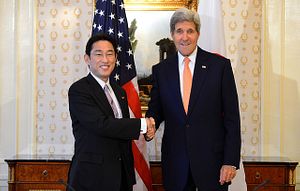Since the Japan’s delegation to the U.N. General Assembly meeting arrived on Tuesday, led by Prime Minister Shinzo Abe and Foreign Minister Fumio Kishida, the government has been doing what it does best abroad, promoting Japan as a strengthening security partner and consolidating its relationships across several regions and issues at once. Abe in particular has become somewhat of a diplomatic road warrior, traveling to more countries than any previous prime minister, while employing a two-pronged foreign policy approach of developing security relationships alongside investment deals for Japanese companies. However, so far during this current visit to U.N. headquarters in New York City, security has played a much more prominent role.
It began on Tuesday with the situation in the Middle East, when Kishida voiced Japan’s support for the new U.S. campaign against ISIS in Iraq and Syria through air strikes. He told U.S. Secretary of State John Kerry that Japan would cooperate by contributing humanitarian aid, and that Tokyo would increase its previous promise of nonmilitary aid from $2.8 million to $25.5 million.
While Japan has been careful not to mention any sort of assistance that could be construed as an implementation of its new interpretation of collective self-defense, it is using its familiar ties with Iran to help give Japanese allies leverage over ISIS. On Tuesday, Abe approached Iranian President Hassan Rouhani to discuss two issues that are important to Japan’s U.S. and European allies: the successful conclusion of negotiations over its nuclear program by the November 24 deadline, and Iran’s assistance in fighting against ISIS. In addition to once large investments in Iran’s energy sector that Tokyo has an interest in one day resuming, having Tehran use its substantial regional clout against ISIS could also create the bandwidth for the U.S. to return its focus to its Asian rebalance, according to a foreign ministry official who spoke with the Nikkei.
Alongside Japan’s negotiations on the Middle East situation, Abe on Wednesday also spent time with Australian Prime Minister Tony Abbott, with whom he has forged a close working relationship. Japan and Australia signed significant security and military trade agreements this summer, with Canberra now rumored to be seriously considering replacing its fleet of Collins-class submarines with off-the-shelf imports of Japan’s Soryu-class diesel submarines. Yesterday the two leaders said they are working to accelerate a new security agreement that would “strengthen cooperation in security and disaster relief between Japan’s Self-Defense Forces and the Australian military,” according to Kyodo News. In addition to bilateral defense cooperation, Japanese government officials said the two leaders expressed their desire to increase cooperation with the U.S. and India in order to promote security in the Indo-Pacific region. An emphasis on such quadrilateral ties is a key component of Abe’s strategy of forging security relationships throughout the region, as a counter to China’s increasing influence, particularly in the South China Sea. While all four countries have strong economic ties to China, they are all concerned with Chinese assertions of sovereignty in the region, and how that may affect the overall regional status quo.
Finally, the Japanese government released a draft of a speech that Abe will make before the U.N. on Friday, concerning its role in Africa. Japan plans to become more active in the U.N.’s African peacekeeping operations. Not only does the plan increase Japan’s training and materiel programs, Abe could possibly announce the deployment of a Self-Defense Forces officer to command an unspecified body of U.N. peacekeepers. In addition to taking a leadership role, Japan will likely seek to expand the role of SDF troops during operations, to include building infrastructure and camps to house and train troops, which is in line with the new interpretation of collective self-defense.
Abe has also reportedly been speaking with leaders and U.N. officials about Security Council reform, to include an expanded council that would include the Group of Four – Japan, Germany, Brazil and India. While a much less likely and longer-term strategy, Japan’s policy of pushing forward its agenda on a number of issues, or at the very least using its leverage to facilitate allied objectives, shows the level of confidence and skill Abe’s government has developed in its foreign policy. This confidence is evident in Abe’s repeated requests to meet with Chinese President Xi Jinping, despite a dramatic deterioration in their bilateral relationship since Abe became prime minister. As long as Japan is able to find regional allies like the U.S. and Australia that support this offensive approach to foreign policy, Abe can be expected to continue his almost breakneck diplomatic schedule.

































